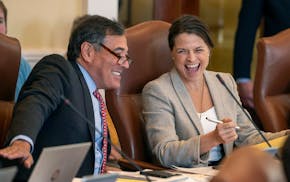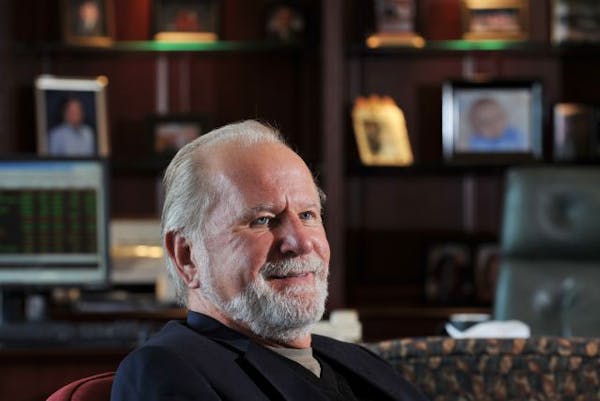Legislators and business leaders are bracing for Gov. Mark Dayton to ask Minnesotans on Tuesday to pay sales taxes on more goods and services.
Dayton has kept his budget proposal a secret, but likely targets for new or increased sales taxes include cigarettes, some consumer services and perhaps the most politically vexing target -- a first-ever tax on clothing.
"This is a significant moment and a significant opportunity," said Dayton's chief of staff, Tina Smith. "For over a decade, the amount of money we raised and how we raised it, the amount we spent and how we spent it, was out of whack. The governor's intention is to address that big problem."
Over the weekend, Dayton's team was piecing together the final components of a proposal that could yield the most comprehensive tax overhaul in a generation. Emboldened by a DFL-controlled Legislature, the Democratic governor's budget outline proposes to wipe out a $1.1 billion projected deficit, realign the state's tax burden and boost state spending.
Making good on a campaign pledge, the governor is expected to ask Minnesota's wealthiest residents to pay higher state income taxes and to end a menu of corporate tax breaks. Dayton has also pledged to include some spending cuts and more government streamlining.
The potential payoff for Minnesotans: Dramatically lower corporate income tax rates, direct property tax relief and more money for education, a top priority for Dayton and many business leaders.
Dayton has been recuperating from back surgery and will make his first public appearance in weeks at the Capitol on Tuesday. Dayton's much-anticipated budget release will become the framework that will guide budget deliberations for the rest of the legislative session.
The new budget could stabilize historically uneven revenue streams that have caused years of budget shortfalls. But it also could open Dayton to a deluge of criticism that he is gorging on a buffet of tax increases that could damage the state's fragile economy.
"What he has said since he was sworn in is that he wants to raise taxes, so we are going to see tax increases," said Assistant Senate Minority Leader Dave Thompson, R-Lakeville. "If he is going to try to appeal to the people who got him elected, he is going to show us a big budget with a lot of tax increases in it."
Revenue Commissioner Myron Frans said Dayton's overriding goal has always been to make the state's tax system simpler and fairer. That, he said, requires an unflinching look at the state's sales tax.
A volatile combination
At 6.8 percent, Minnesota's sales-tax rate is among the highest in the nation, but it is applied to a far narrower base of goods and services than most states. Groceries, clothing and prescription drugs are exempt from the Minnesota sales tax. So are legal fees, haircuts and a long list of other exemptions. That makes the state's sales-tax stream more volatile than those of most states.
"If we don't take a look at that, it's a burden on everyone else," Frans said. "Everybody is paying a higher rate because of those exemptions. We are trying to make the entire system as fair to everyone as possible."
Extending the sales tax to clothing, for instance, would bring in roughly $300 million a year. Minnesota's $1.58-per-pack cigarette tax is far lower than many states, including Wisconsin. Adding $1 per pack would bring in $200 million a year.
Budget and tax experts say it would not be too hard to cobble together a list of new items or services to tax and get close to $1 billion in new sales-tax revenue even with a lower rate.
The anticipated budget proposal would be a departure for Dayton, who campaigned almost entirely on a pledge of raising income taxes on high earners.
Two years ago, facing a $6.1 billion projected shortfall, the governor proposed more than $4 billion in new revenue, largely from income and property tax hikes for top earners. He made no effort to overhaul the sales tax.
Republicans who controlled the Legislature rejected the plan in favor of a mix of cuts, payments shifts and borrowing.
Some in party opposed
Dayton's proposal to tax high earners has run up against some political and practical realities. First, President Obama recently pushed Congress to raise the federal income tax rate for high earners, potentially limiting how much more Dayton could raise and not overburden the wealthy. Some DFLers have cooled to steep income tax increases on high earners, saying they don't want to make it harder for the state's leading companies to recruit top talent.
Legislative leaders now say it would be difficult to get $1 billion in new income tax money from high earners, about half of what Dayton sought two years ago.
"There's some room, but there are some limitations," said Senate Majority Leader Tom Bakk, DFL-Cook. "We need to be careful with it. It is not an unlimited pool of money."
Dayton and his commissioners will now seek a more complete solution to the state's years-old budget woes. "What's a bold departure is that the governor has had a chance to look at all the options," said Jim Schowalter, Minnesota Management and Budget commissioner.
With DFLers firmly in control at the Capitol, a growing number of business leaders are signaling a new willingness to consider sales-tax changes. They also share Dayton's desire to use additional money to increase funding for education, particularly early childhood learning.
Some groups that have historically fought hard against any tax increases, including the Minnesota Business Partnership, have said they could be open to a clothing tax.
"Good tax policy is broad and low," said Ken Powell, CEO of General Mills, who met with Dayton earlier this month. The one exception, he said, are business-to-business services, which if taxed would be "devastating to our competitiveness."
Legislators have already begun looking at some of the options Dayton is expected to propose. They have already unveiled their own proposals to tax clothing, raise tobacco taxes and require Internet retailers to collect state taxes. To limit the impact of a clothing tax on lower-income Minnesotans, the two DFL bills include either an income tax rebate at certain income levels or a plan to tax only higher-end clothing above $200.
The Mall of America, the state's largest tourist destination, remains firmly opposed to a clothing tax. Mall executives say the state's tax-free clothing gives it an enormous edge when it markets to other states, even other countries.
"Once we can't use the word 'no' sales tax on clothing, we lose that competitive advantage," said Maureen Bausch, executive vice president of business development for the mall.
Baird Helgeson • 651-925-5044

Rep. Ilhan Omar's daughter suspended from college for involvement in pro-Palestinian protests

